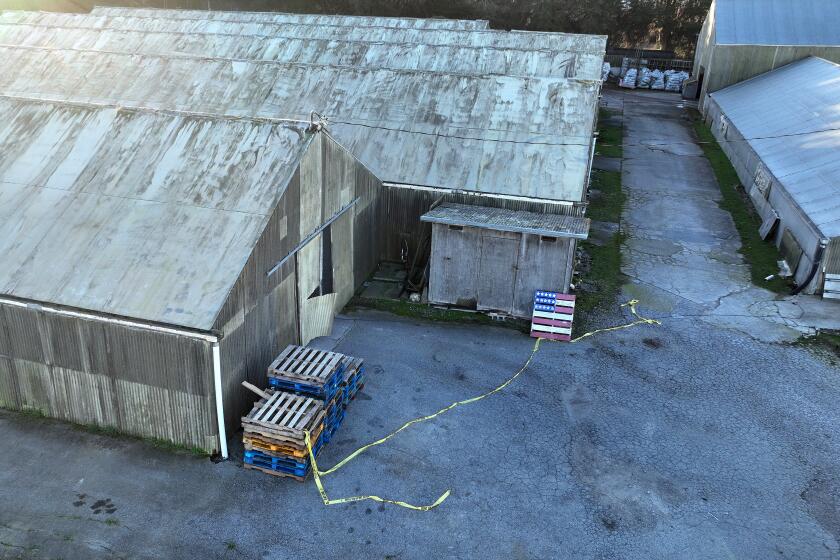Grieving Family Says ’73 Laos Crash Didn’t Kill Son
Kate Rothacker of Mission Viejo has had versions of the same dream off and on since 1973. In some, her brother Joe comes home on crutches. Sometimes, he comes home blind. Or, he comes home crazy. But he always comes home.
In reality, no one knows exactly what happened to Joseph Matejov--one of the 2,303 American servicemen in Vietnam for whom the government has yet to account.
For families of those men, today’s Memorial Day remembrances only underscore the grief still emanating from an undeclared, unsuccessful war that left wounds so deep that scars have not formed.
“It’s a very emotional time for most of the families,” said Judie Mills Taber of La Habra, California coordinator for the National League of Families of American Prisoners and Missing in Southeast Asia, an organization with a mailing list of 12,000. “We don’t know if they’ve given their lives or not.”
Matejov’s case is particularly difficult because his family insists that they have found evidence that he was captured alive--despite a U.S. Air Force declaration that he had been killed when his EC47 plane was shot down Feb. 5, 1973, over Laos.
All nine brothers and sisters in the devoutly Catholic, military family firmly believe that Joe Matejov--a handsome, popular 21-year old when he vanished--is still alive after 17 years, Rothacker said.
“No one has said he is dead,” said Rothacker, 35, a homemaker and mother of four. She wears two POW bracelets, one with Joe’s name and one for another missing soldier. POW signs are pasted on the windows of her home and station wagon.
Her children include prayers for Uncle Joe around the family dinner table.
Kate Rothacker remembers her brother as generous, considerate, handsome and hard working. “He was every mother’s dream.” Once, he took her shopping to buy himself a clock radio but kept asking which one she preferred, ultimately asking her to keep it for him. “In effect, he was giving me a present.”
Rothacker was 18 when a U.S. Air Force representative knocked on the door of their East Meadow, N.Y., home to say that Joe had been killed during an intelligence-gathering mission over Laos--eight days after the signing of the Paris Peace Accords. The officials said he had died instantly with seven others when their plane was shot down and disintegrated.
They held a memorial service.
Then, five years later, the family began to hear other accounts--first reported by columnist Jack Anderson on “Good Morning America”--that four of the eight men, including Joe Matejov, had bailed out of the plane.
Because one crew member’s personal effects included a letter suggesting that their mission broke the new peace treaty, it was hinted that the United States had tried to cover up a possibly illegal spy mission, Rothacker said.
In his service record, Joe’s parents, Mary and Stephen Matejov, found Air Force transcripts of intercepted enemy radio transmissions describing “air pirates” captured the day of the crash in the area and where they were being taken. Pentagon officials said descriptions of the prisoners described in the transcripts do not match Matejov or other crew members.
Finally, Mary Matejov said, she and her husband were told six or seven years ago by Roger Shields, who was deputy assistant secretary of defense in charge of POW/MIA affairs at the time of the crew’s disappearance, that the four missing crew members were intentionally listed as dead in order to protect them.
“He said he was afraid the Vietnamese might say, ‘This plane was flying; you broke the treaty; we don’t have to return the men,’ ” she said from her Hampton, Va., home.
Shields, now chief international economist with Chemical Bank in New York, denied telling the Matejovs their son was alive and was deliberately declared dead. He said there was no reason to cover up the flight, which was legal.
However, based on the radio intercepts, he had opposed the Air Force secretary’s finding that the crew died in the crash and still believes that declaring them dead was a mistake, he said in a telephone interview last week from London.
He said he strongly suspects that they were captured because the date of the “air pirate” transmission was the same as the crash, there were very few planes in the area at the time and the broadcast was beamed directly to Hanoi from not farther than 60 miles from the crash site.
“I think the Air Force was wrong, but the judgment was not made out of malice. It was not part of a conspiracy. As far as I know, no one ever lied to her. The Air Force secretary has a right to make those calls. In their judgment, he was dead. I dispute the judgment; she disputes the judgment. A (bad) judgment does not amount to a lie.”
Had they been declared missing, he said, “efforts to find them might have gone on in a different vein.”
“She’s right to feel there’s more information available, but whether that means her son is alive is another issue.”
Shields said that he has no hope that the crew members are still alive but believes that families such as the Matejovs “deserve massive amounts of sympathy.”
Pentagon spokesman Lt. Cmdr. Edward Lundquist said: “There is no evidence that any crew members survived the crash and no evidence that any crew members were captured by enemy forces.” He said the plane plunged, bounced once, landed upside down and burned.
A search party four days after the crash was not able to lift the fuselage to look for remains, he said.
He said he would not comment on the cover-up issue because facts of the case were not immediately available.
Since the fall of Saigon in 1975, there have been 11,754 reports of POWs or MIAs, and the Pentagon continues to receive about a dozen reports a month, Lundquist said. The vast majority have been accounted for, he said.
Only 131 of the 2,303 unresolved cases involve first-hand reports of “live sightings,” he said. Of those, 76 were held under guard when seen and 55 were reported to be living in “non-captive” situations such as with a Vietnamese family in a village.
So far, the government has been unable to prove that any Americans are being detained against their will in Southeast Asia, Lundquist said. But since 1981, official government policy precludes ruling out the possibility, and roughly 100 people are employed full time to investigate cases under the assumption that some are still alive, he said.
“It is an unrealistic expectation that we will be able to account for all of them,” he said. In World War II, 78,750 servicemen (or 18% of all those who served) remain unaccounted for, as well as 8,177 (15%) from the Korean War. In Vietnam, 4% remain unaccounted for.
Matejov is not among the high-priority cases, a ranking created to facilitate recovery efforts with Vietnam, Lundquist said. Those are cases of 80 Americans for whom there is “strong evidence that they survived their incident and were captured, or otherwise came under control of the Indochinese governments or about whom those governments should have information. Yet neither these men, nor their remains have been returned,” Lundquist said.
However, Matejov’s name has been submitted seven times, most recently in February of this year, to the Joint Casualty Resolution Center, at Barber’s Point Naval Air Station in Hawaii, which mounts investigations with Southeast Asian governments.
So far, the Lao government has rejected the request for unknown reasons. The most recent request is unanswered, said George Atkinson, chief of Air Force Missing Persons.
As a result of expeditions, the Air Force retrieved the remains of 42 people last year--a far greater number than in any one year so far since the war, he said.
“I don’t think families understand how much work has been done,” he said. “It’s a personal thing with them.”
Mary Matejov and her daughter, Kate Rothacker, speak on the issue, hoping to galvanize public opinion and spur greater government efforts to find prisoners. And they pray--though Rothacker said she is sometimes unsure what to pray for.
“I don’t expect him to come home completely normal,” his mother said. “I imagine he would be hospitalized for quite some time. I do believe they might have played with his mind. I’m prepared for that. . . . He may have been given a family. If he’s got a family, bring them here. They’re welcome too.
“I want him home where he belongs. He belongs on American soil. He doesn’t belong over there.”
One of the hardest parts for the family has been a loss of faith in a government to which it had been devoted.
Mary Matejov’s husband, who died in 1984, was a career Army officer. Others in her family have served in the Marines, the Navy and the Air Force.
But because they believe that the government lied about Joe, her two youngest sons said they would join the service only if drafted.
“When we thought he was dead, we felt we were one of the families that had to have the pain,” Mary Matejov said. “That happens in war time. We accepted it. It was his career. Somebody’s going to be killed.
“When we found out the truth, it was like somebody sticking a knife in and twisting it. At first we didn’t believe it. It was hard for my husband to believe in the beginning, until we saw the radio intercepts.”
Said Rothacker, whose husband is a former Marine, “The feeling I have is of betrayal. We had faith in the government. What would you do if your mom stabbed you in the back?”
Jack Anderson, whose broadcast changed the focus of the family’s lives, cannot remember specifics of his report, other than that his information came from sources inside the Pentagon or the CIA. “Washington tells the public one story, we tried to tell a different story--the one that has been suppressed.”
Joe’s mother and sister say faith keeps them going in their efforts to bring live prisoners home. “Sometimes I get quite tired,” Mary Matejov said. “I do want to quit, and yet I don’t. I just can’t.
“Until my last breath I can’t quit. I have to know the answer. I can’t just leave it hanging and not know.”
Kate hasn’t dreamed of Joe for several years now. The last time, she awoke less startled at having seen him than of having had the same dream once again after all these years.
In it as in all the others, she and her mother meet Joe at the door. And she tells him: “I knew you’d come home.”
More to Read
Start your day right
Sign up for Essential California for news, features and recommendations from the L.A. Times and beyond in your inbox six days a week.
You may occasionally receive promotional content from the Los Angeles Times.






